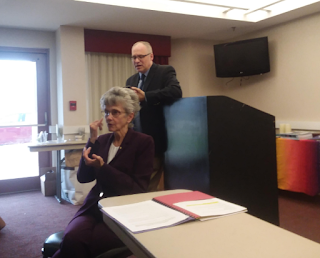Here are the highlights of postings this
week from the Association of Ministers with Disabilities,
Disability Ministries Committee, Mental Health Ministries, Deaf
and Hard-of-hearing Ministries Committee, and UM Congress of the
Deaf:
-
AMD
DMC
DHM
MHM
NEJ Deaf Ministry Boot Camp, May 18, 2019
https://www.umcd.org/newsnej/1905.html
-
Click here for a list of events of interest to people in disability ministry.

This newsletter is generally issued weekly by the
United Methodist Association of Ministers with Disabilities,
a caucus of the United Methodist Church.
Click here to join this e-mail list.
This newsletter is also published on the UM Disability Blog
Visit us on the web or Facebook.
-
AMD
- A better way: https://crippastor.wordpress.com/2019/04/11/bitterness-theres-a-better-way/
- And love is bigger: https://crippastor.wordpress.com/2019/04/15/take-heart-love-is-bigger/
- Hope and prayer: https://crippastor.wordpress.com/2019/04/16/notre-dame-our-hope-and-prayer/
- Hope with a heavy heart: https://crippastor.wordpress.com/2019/04/22/sri-lanka-hope-with-a-heavy-heart/
- Clergy against Alzheimer's: https://www.usagainstalzheimers.org/networks/faith
- Disability and disasters: https://www.numotion.com/blog/february-2019/14-questions-with-vance-taylor
- Suicide prevention: https://myemail.constantcontact.com/Suicide-Prevention-Competencies-for-Faith-Leaders---New-Resource-Released.html
- Doubting Thomas:
https://crippastor.wordpress.com/2019/04/25/are-you-a-doubting-thomas/
DMC
- Are you happy? https://www.facebook.com/PresbyteriansForDisabilityConcerns/photos/a.378895829507242/379895799407245/?type=3&theater
- God, the spurned lover: https://www.castlechurchbrewing.com/blog/god-the-spurned-lover
- Global Accessibility webinars: https://mailchi.mp/unh/join-us-for-a-free-3-part-accessibility-webinar-series
- Acceptance, not awareness: https://wfpl.org/these-autistic-friends-want-acceptance-rather-than-an-awareness-campaign/
- Reading software: https://beckiewrites.com/2019/04/22/im-visually-impaired-and-voice-dream-reader-enables-me-to-read-120-books-a-year/
- UMC seeks to provide housing: https://www.dailyprogress.com/news/local/city/church-seeks-to-build-housing-for-those-with-developmental-disabilities/article_9fe7df50-63ae-11e9-82b3-73e8f3b73e7e.html
- Social skills: https://disabledchristianity.blogspot.com/2019/04/disability-ministry-and-social-skills.html
DHM
- Grant application updates: https://www.umdeaf.org/fund.html
- Learning from hearing loss: https://livingwithhearingloss.com/2019/04/09/what-my-hearing-loss-has-taught-me/
- Deaf man, Deaf dog: https://metro.co.uk/2019/04/14/deaf-man-adopts-deaf-dog-teaches-commands-sign-language-9199363/
MHM
- Prince Harry on depression: https://www.facebook.com/permalink.php?story_fbid=2291099947579678&id=186943104662050¬if_id=1555351622909279¬if_t=scheduled_post_published&ref=notif
NEJ Deaf Ministry Boot Camp, May 18, 2019
https://www.umcd.org/newsnej/1905.html
-
Click here for a list of events of interest to people in disability ministry.

This newsletter is generally issued weekly by the
United Methodist Association of Ministers with Disabilities,
a caucus of the United Methodist Church.
Click here to join this e-mail list.
This newsletter is also published on the UM Disability Blog
Visit us on the web or Facebook.






